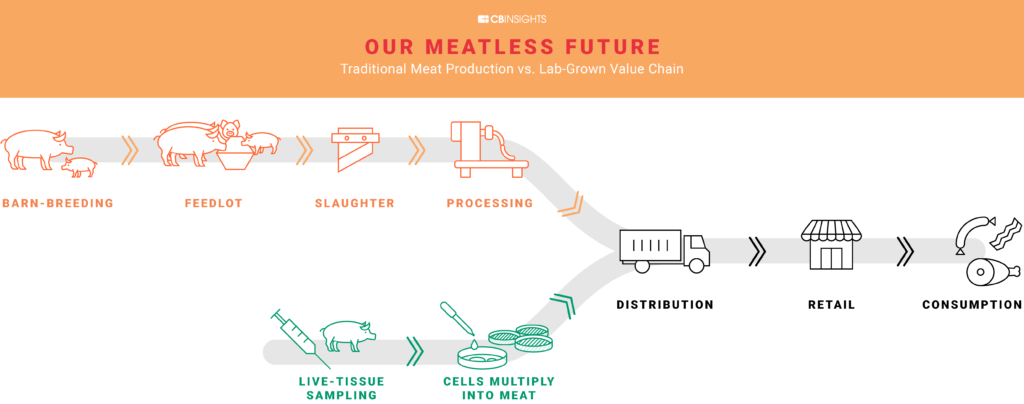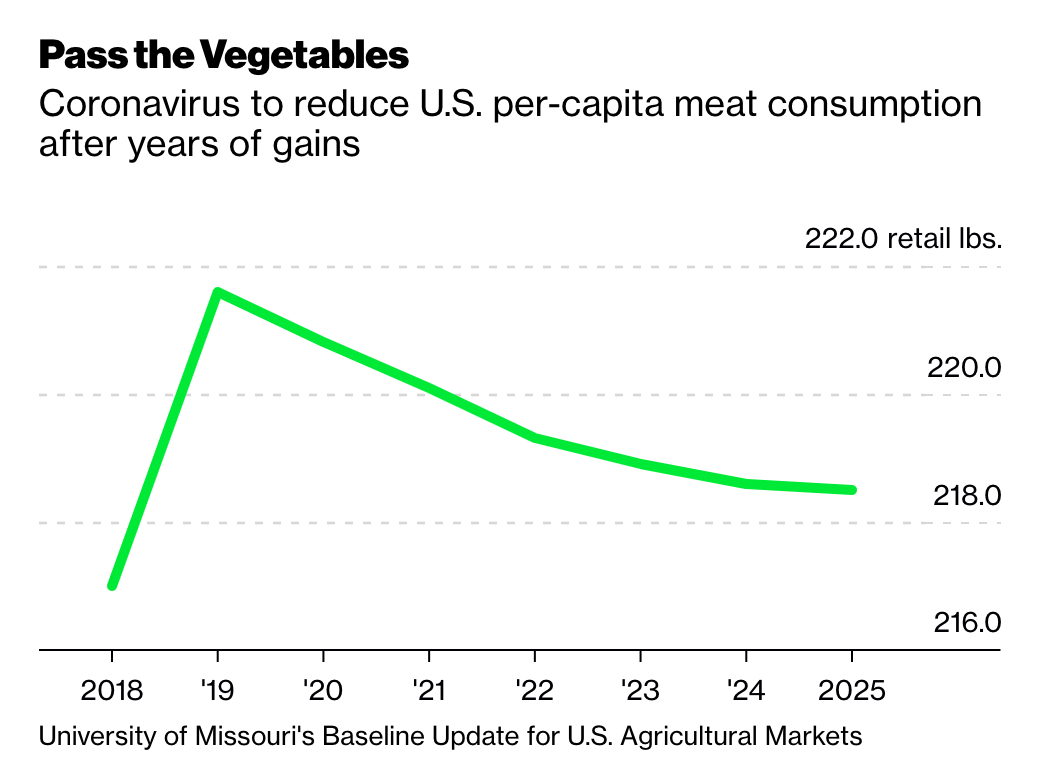And a lot of the folks behind the hype-n-tout do want to mandate the transition.
So, in anticipation of this happening, I accept in advance my coming coronation as the Chickpea King.
(also Marquis de Mung Beans and a couple courtesy titles to be named later)
From CB Insights, July 15:
Our Meatless Future: How The $2.7T Global Meat Market Gets Disrupted
Will a meatless food industry featuring lab-grown meat, seafood substitutes, and insect protein be the future of food? As Covid-19 upends the traditional meat supply chain, food giants and startups alike are working to navigate a future where protein isn't dominated by conventional meat sources.At the moment, meat is still king.
By some estimates, 30% of the calories consumed globally by humans come from meat products, including beef, chicken, and pork. The global meat market could be worth as much as $2.7T by 2040, according to CB Insights’ Industry Analyst Consensus.
Americans consumed a near-record 220 pounds of red meat and poultry per capita in 2018 — in 1960, that figure was just 167 pounds, according to the USDA.
To meet this growing demand, the meat industry has evolved into a complex global business that involves farms and feed lots, as well as meat middle-men, like processing and storage centers, transportation and logistics, slaughterhouses, and more.
In the US, just 4 producers — Tyson Foods, JBS, Cargill, and National Beef — control more than two-thirds of all US beef processing.
But as Covid-19 spreads across the globe, shifting consumer behavior and virus outbreaks in factories dealt major blows to the meat supply chain, which is estimated to face losses of more than $20B in 2020.
Source: Bloomberg
In contrast, startups focusing on plant-based protein — including Plantible Foods, Rebellyous Foods, Livekindly, and InnovoPro— have continued securing millions in funding amid the pandemic. Demand for vegan meat soared, with sales up by a staggering 264% in the 9 weeks ended May 2, 2020.
Going forward, the meat value chain could be simplified dramatically, as “clean meat” labs could take the place of farms, feed lots, and slaughterhouses.
Using CB Insights data, we dug into some of the major trends in the growing meatless industry, from startups to watch to key investors to future trends & challenges.
TABLE OF CONTENTS
The current state of the meat and plant-based industries
In the past decade, the meat industry has seen massive consolidation, as companies like Hormel and Brazil-based JBS have grown bigger and bigger through the acquisition of new meat brands and products.
One of the biggest deals in this space was pork producer W.H. Group’s $4.7B acquisition of US-based Smithfield Foods, which owns brands such as Armour and Farmland, in 2013.
Since 2014, Hormel has spent around $3B on acquisitions, including Applegate, Fontanini Italian Meats and Sausages, Ceratti, and Columbus Manufacturing.
Despite high-profile deals in the sector, the industrial meat industry faces a rising tide of challenges related to business, ethical, and environmental concerns.
These corporations have also begun the shift into plant-based protein amid pressure from upstarts and changes in consumer behavior. The world’s largest meat company, JBS launched its own meatless protein in June 2020. Other meatpackers offering their own lines of plant-based alternatives include Tyson, Smithfield, Hormel, and Cargill.
Meanwhile, startups using technology to engineer meat in labs or manufacture it from plant-based products are rising in popularity.
In 2019, one of the world’s biggest alternative protein brands, Beyond Meat, which manufactures the plant-based Beyond Burger, went public at a valuation of almost $1.5B. The company is making inroads into Asian markets, inking a deal with Starbucks in April 2020 to offer its meatless sausage in China. In June, Beyond Meat also announced that it would debut its products in select KFC, Pizza Hut and Taco Bell stores in China.
Beyond Meat’s chief competitor, Impossible Foods has also seen aggressive growth. The Redwood City-based company has aggregated more than $1.3B in total disclosed funding. Its products can be found at chains like Burger King, Qdoba, White Castle, and Red Robin.
Valued at $4B as of March 2020, Impossible Foods has seen rapid expansion this year as well, forging a partnership with Kroger to sell its burgers across 1,700 Kroger-owned grocery stores nationwide, up from just 150 grocery stores selling its burger at the beginning of 2020. Starbucks also recently announced that it would add an Impossible Foods sandwich to its US menu.
Impossible Foods president Dennis Woodside has said he expects the company’s retail footprint to expand more than 50-fold in 2020 alone.
“This is why I think people are increasingly aware plant-based products are going to completely replace the animal-based products in the food world within the next 15 years,” Impossible Foods founder and CEO Pat Brown said in a June interview. “That’s our mission. That transformation is inevitable.”Why the shift towards meatless?
Covid-19 may accelerate the shift to meatless alternatives
During the onset of the coronavirus pandemic, the meat industry was slammed by warnings of meat shortages due to shuttered plants, resulting price increases, and growing numbers of sick workers — conditions that would potentially present new opportunities for plant-based companies.
Traditional meat distribution channels were and remain upended, as restaurants, schools, and other facilities closed. Declining output and rising prices left consumers with fewer options, and plant-based meat alternatives began to see a lift.
Source: Bloomberg
The plant-based meat industry saw sales surge 264% in the 9 weeks ended May 2. While these numbers are still a small portion of meat sales, their growth still highlights the opportunity that meat alternatives gained amid the pandemic. Even dairy alternatives saw a surge: in the first week of March, oat milk sales were up 347% year-over-year against a backdrop of declining dairy demand.
Beyond the shortage, the pandemic has also forced many consumers to face issues in the meat supply chain for the first time, including the health of the workers or the ethical treatment of animals.
Reports of the millions of animals being euthanized as slaughterhouses were forced to close fueled consumer distaste. The outbreak has resulted in reportedly the largest pig culling the US has ever seen, with about a billion pounds of meat destroyed in the second quarter alone.
As America’s largest meat suppliers reopened, their employees reported unsafe working conditions, with scarce precautions for social distancing. Meatpacking plants were found to be coronavirus hotspots — at least 35,000+ meatpacking workers have tested positive for Covid-19 and over 150 food processing have died, according to the Food and Environment Reporting Network.
News of meat factories’ concentrated Covid-19 outbreaks may cast traditional meat products in an unappealing light, influencing consumers to opt for plant-based alternatives instead.
“Covid is shining a light for consumers to start evaluating their own choices and whether or not they want to continue to buy meat,” Josh Balk, vice president of farm animal protection for the Humane Society, said in an interview with Bloomberg News.
Source: Bloomberg
Macro reasons propelling the meatless trend....MUCH MORE
Beyond Covid-19, there are several macro-level reasons for the shift toward a more meatless future....



